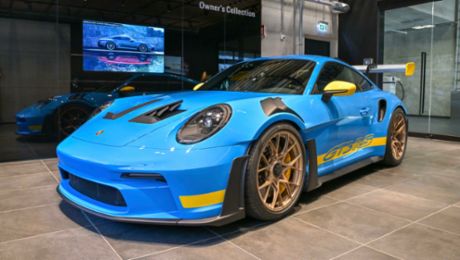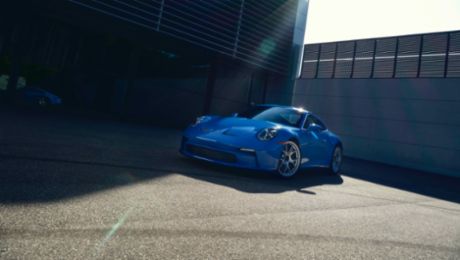Almost 20 years after production of the legendary Carrera GT ended, Porsche, in collaboration with Michelin, is presenting new ultra-high-performance tyres for the super sports car. Making use of the latest advances in tyre technology, the rubber compound and the structure of the high-performance tyres have been optimised to enhance their performance in both wet and dry conditions. Development driver and Porsche brand ambassador Jörg Bergmeister has already tested the new Michelin Pilot Sport Cup 2. “The Carrera GT is an absolute dream car. So I’m delighted that these new tyres have taken the performance of this legend to a whole new level,” says the former Porsche works driver.
Second tyre update for the Carrera GT
On its debut in 2003, the Porsche Carrera GT was one of the fastest series production cars. Porsche originally developed the naturally aspirated V10 engine for racing at the 24 Hours of Le Mans, although in the Carrera GT its displacement was increased from 5.5 to 5.7 litres. Its 450 kW (612 PS) output propels the car’s mere 1,380 kg weight. Maximum torque is 590 Nm, and the Carrera GT’s top speed is 330 km/h. The car sprints from 0 to 100 km/h in 3.9 seconds.
From the very beginning, the super sports car was fitted with bespoke Michelin tyres – originally, the Pilot Sport PS2. The first update came in 2013 with the arrival of the Pilot Super Sport tyres, which are now superseded by the newly developed Pilot Sport Cup 2, bearing the N-marking reserved exclusively for Porsche. The first iteration of this new tyre will carry the N0 marking.
Tyre development with no compromises
“Developing new tyres for a 20-year-old car is very unusual,” says Bergmeister. “It shows how important the Carrera GT and its customers are to Porsche to this day.” The goal in developing the new tyres – a process in which Bergmeister was involved – was to further improve the driving dynamics and safety of the super sports car on both wet and dry roads. To achieve this, two different rubber compounds (bi-compound technology) are used in the tread. “We use silicic acid on the inner shoulder and the inner tread block to get the best compound for wet grip,” explains Mathieu Greco, the development engineer at Michelin responsible for tyres for Porsche sports cars. “The compound on the outer shoulder and the outer tread block of the tyre is designed for dry grip. One of the most important ingredients here is carbon black.”
The contact patch was further optimised with thorough testing of driving dynamics and handling, some of which was conducted on the legendary Nürburgring Nordschleife. The objective was to create the optimal tyre for the Carrera GT high-performance sports car. Jörg Bergmeister on the result: “I’m impressed by how the engineers improved the feedback at the upper limits. You feel much more distinctly the point at which the tyre starts to lose its grip.”
The classic car is now faster and safer
The improved balance provides significantly enhanced driving dynamics and enables even faster lap times on track. Bergmeister explains: “The new tyres not only make the Carrera GT faster, they make it easier for the car to be driven at speed. This shows that tyre development is always moving forward. Motorsport, in particular, is a development platform that ensures that advances in tyre technology find their way directly into series-production tyres. This technology transfer enhances performance significantly.”
In addition to improved feedback at the upper limits, the newly developed Michelin Pilot Sport Cup 2 also ensures that the Carrera GT comes to a stop faster during emergency braking. The braking distance from 100 km/h to a standstill is 2.5 metres shorter. From 200 km/h, the super sports car stops a full 12 metres earlier. “Tyres specially developed for a car are always an advantage. Not just for the performance, but also for driving safety. The data to illustrate this is impressive,” concludes Bergmeister.
The new Michelin Pilot Sport Cup 2 tyres for the Carrera GT were developed in close collaboration between Michelin, Porsche Classic and the Porsche Development Centre in Weissach. They can be ordered from Porsche Classic Partners or any Porsche Centre.


